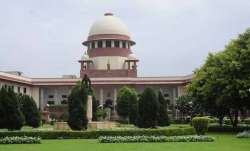PIL filed in Supreme Court against Home Ministry's notification allowing 10 agencies to conduct surveillance
Strongly defending its action, the government hit back at the Congress saying the order was a mere repetition of a notification issued in 2009 during the UPA rule.

A Public Interest Litigation (PIL) was filed in Supreme Court on Monday against the Home Ministry's notification allowing 10 agencies to conduct surveillance.
A major controversy broke out on Friday with the government authorising ten central security and investigating agencies to monitor and intercept all computers, a decision that came under severe attack from the Opposition which accused the government of creating a surveillance state.
Strongly defending its action, the government hit back at the Congress saying the order was a mere repetition of a notification issued in 2009 during the UPA rule.
The issue came to the fore with the Union Home Ministry on Thursday issuing an order authorising 10 central security and investigative agencies and the Delhi Police to "intercept, monitor and decrypt any information generated, transmitted, received or stored in any computer".
The 10 agencies given the powers of interception are the Intelligence Bureau, Narcotics Control Bureau, Enforcement Directorate, CBDT, DRI, CBI, NIA, RAW, Directorate of Signal Intelligence (for service areas of Jammu and Kashmir, Northeast and Assam only) and Delhi Police.
The Opposition, both inside and outside Parliament, slammed the government calling the decision an "undeclared Emergency" and an assault on the citizens' fundamental right to privacy and demanded its withdrawal.
Congress leader Anand Sharma said it was an attempt to create a surveillance state, a view shared by many other leaders who also termed it as an Orwellian state.
The issue rocked the Rajya Sabha which was adjourned with the opposition members protesting against the government and indulging in slogan shouting.
Finance Minister Arun Jaitley rose to put up a strong defence of the government recalling that Thursday's order was only a repetition of a similar order issued under the rules framed during the UPA regime in 2009 to the Information and Technology Act enacted in 2000.
He said what was originally provided for in the Telegraph Act that applied to telephones was extended to computers under the IT Act with modernisation.
"Your government has used it in the past. Our governments have also used it. Every government has used it. The same agencies had the power earlier. In 2009 rules were framed which authorised the same agencies to intercept anybody who played with national security, public order and integrity of India."
(With inputs from IANS)